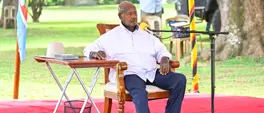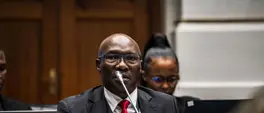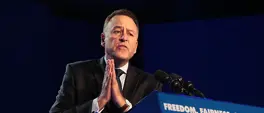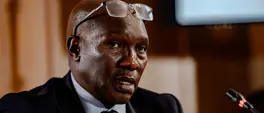JAMIL F. KHAN | Addressing South Africa’s gender-based violence crisis requires deep societal change
Jamil F. Khan
26 November 2025 | 11:20"If we do not pursue sophisticated solutions, we risk creating the impression of addressing the problem while solving it only for a privileged few."
- Cyril Ramaphosa
- 16 Days of Activism for No Violence against Women and Children
- Gender-based violence (GBV)
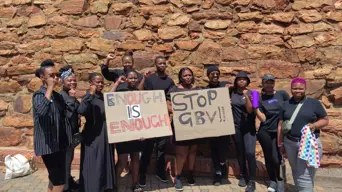
Women for Change demonstrators ahead of their planned national shutdown against gender-based violence and femicide (GBVF) on 21 November 2025 ahead of the G20 Leaders’ Summit. Picture: Ntokozo Khumalo/EWN
Just hours before the nationwide shutdown in protest of gender-based violence and femicide, President Cyril Ramaphosa announced that these scourges will officially be classified as a national disaster.
This classification requires all organs of state to implement existing policy measures to mitigate the crisis effectively.
Government has clarified that this classification is not the same as a formal declaration of a national disaster, which triggers access to emergency funds and special powers for disaster management.
Though there appears to be sincere and earnest engagement with the matter, we have been misled by such performances before.
This action by government represents more of an opportunity than a resolution, an opportunity to confront not just the scourge of gender-based violence at face value, but to dig deeper into the soul of our nation and ask why we are producing such violent men, and more broadly, such violent people.
The protest last week, led by Women For Change, made clear statements about the impact of women and queer peoplewithdrawing from the economy, an economy that itself metes out violence in the form of exclusion, evidenced by our high unemployment rate.
This issue invites us to think more deeply about how gender interacts with class. In designing interventions to eliminate gender-based violence for all, discussions following this moment must consider how class affects the safety of women and queer people in this country.
All our experiences of violence and our susceptibility to it are not the same, and for a smaller number of people, economic power can buy protection. This does not suggest that wealthier women should be deprioritized, but that solutions must offer protection and eradicate violence at all class levels.
Solutions should be adaptable and elastic in their ability to support all victims of gender-based violence, taking into account the multiple factors contributing to their vulnerability.
When class differences enter the discussion, ace inevitably follows. In South Africa, class and economy are inextricably linked to race in ways that reflect our colonial and apartheid past.
Race, class, and gender intersect to create different experiences of violence for women and queer people of different racial backgrounds. For white people, experiences of violence are often mitigated by access to money and resources inherited as a legacy of historical privilege, which is incompatible with victimhood.
For Black people, whose identities are more readily associated with victimhood and suffering, indifference and apathy have been institutional barriers to receiving help. We do not care about Black lives as much as we care about white lives, making the crisis of gender-based violence also a crisis of perception. Who do we consider victims worthy of help?
With this crisis of perception, this moment of promise for mobilizing action requires us to confront how the institutions we interact with reinforce harmful perceptions around gender that lead to violence Institutions are often the first places where people are introduced to social conventions and rules that set the standards for co-existence.
The work of eliminating gender-based violence does not rest only at the top, it exists at every level of society. We must demand that our institutions change as well. When women are consistently underpaid compared to male colleagues, we reinforce the message that their labor is unequal, and therefore inferior.
When churches denigrate women and queer people, it gives others a license to dismiss and even harm them.
When young boys are taught that masculinity requires the rejection of anything feminine, we teach them that girls have less value and deserve less respect.
When political structures remain overwhelmingly male-dominated, it creates the perception that women leaders are exceptions, worthy of less recognition
As last week’s protest approached, a few institutions published statements supporting the cause, offering their female employees the day off to join.
These institutions were seen as stepping up at a critical moment, but far too many did not.
The seriousness of gender-based violence and femicide requires companies to acknowledge how they may contribute to hostile or indifferent working environments, one of the most harmful acts being silence.
The institutions of family, workplace, politics, and church are just a few of the spaces we must confront to change the gender culture we all participate in.
Reconstructing our perceptions of gender and the norms we then standardise must happen in schools, playgrounds, healthcare facilities, municipalities, among informal traders, and CEOs.
Nobody is exempt, because none of us have escaped the harmful conditioning of patriarchy, which depends on these power imbalances to survive.
Now that gender-based violence and femicide have been classified as a national disaster, the door is open to hold our government accountable but also to hold ourselves accountable.
Government inaction has exacerbated the crisis in South Africa, but we must also reckon with our past and its resultant present, raising difficult questions about the kinds of society we have created. In every national problem, multiple intersections of difference complicate the approaches required to solve them.
If we do not pursue sophisticated solutions, we risk creating the impression of addressing the problem while solving it only for a privileged few.
Our government’s track record over the last 31 years has shown exactly that: one-dimensional solutions that bring change for a small group at the expense of the majority.
If we want an end to corruption, we must also resist corruption in our societal blind spots, which cloud our vision for inclusive, dynamic solutions that truly benefit everyone.
Dr Jamil F. Khan is an award-winning author, doctoral critical diversity scholar, and research fellow at the Johannesburg Institute for Advanced Study.
Get the whole picture 💡
Take a look at the topic timeline for all related articles.



